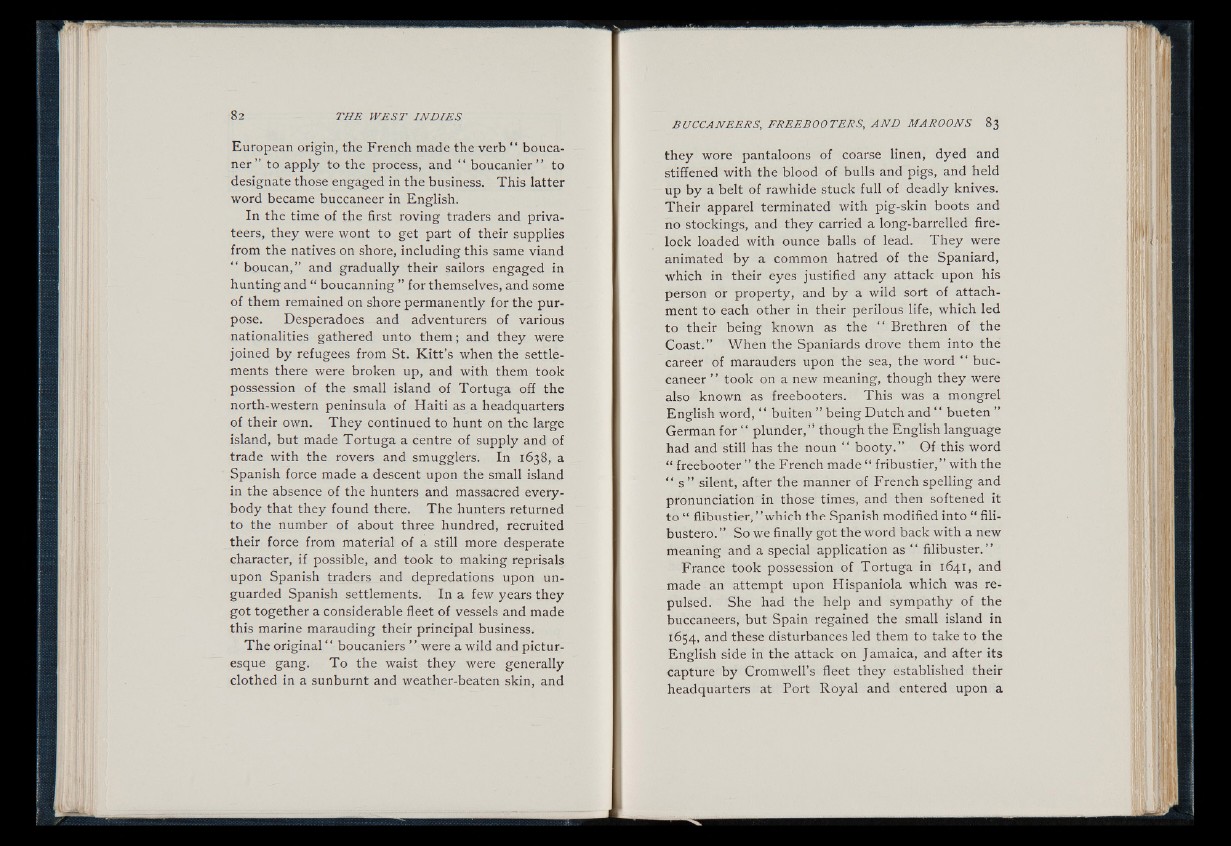
European origin, the French made the verb “ bouca-
ner ” to apply to the process, and “ boucanier” to
designate those engaged in the business. This latter
word became buccaneer in English.
In the time of the first roving traders and privateers,
they were wont to get part of their supplies
from the natives on shore, including this same viand
“ boucan,” and gradually their sailors engaged in
hunting and “ boucanning ” for themselves, and some
of them remained on shore permanently for the purpose.
Desperadoes and adventurers of various
nationalities gathered unto th em ; and they were
joined by refugees from St. K i t t ’s when the settlements
there were broken up, and with them took
possession of the small island of Tortuga off the
north-western peninsula of Haiti as a headquarters
of their own. T h e y continued to hunt on the large
island, but made T ortu ga a centre of supply and of
trade with the rovers and smugglers. In 1638, a
Spanish force made a descent upon the small island
in the absence of the hunters and massacred everybody
that they found there. T h e hunters returned
to the number of about three hundred, recruited
their force from material of a still more desperate
character, if possible, and took to making reprisals
upon Spanish traders and depredations upon unguarded
Spanish settlements. In a few years they
got together a considerable fleet of vessels and made
this marine marauding their principal business.
T h e original“ boucaniers ” were a wild and picturesque
gang. T o the waist they were generally
clothed in a sunburnt and weather-beaten skin, and
they wore pantaloons of coarse linen, dyed and
stiffened with the blood of bulls and pigs, and held
up by a belt of rawhide stuck full of deadly knives.
Their apparel terminated with pig-skin boots and
no stockings, and they carried a long-barrelled firelock
loaded with ounce balls of lead. T h e y were
animated by a common hatred of the Spaniard,
which in their eyes justified any attack upon his
person or property, and by a wild sort of attachment
to each other in their perilous life, which led
to their being known as the “ Brethren of the
Coast.” When the Spaniards drove them into the
career of marauders upon the sea, the word * ‘ buccaneer
’ ’ took on a new meaning, though they were
also known as freebooters. This was a mongrel
English word, “ buiten ” being Dutch and “ bueten ”
German for “ plunder,” though the English language
had and still has the noun “ b o o ty .” Of this word
“ freebooter ” the French made “ fribustier,” with the
“ s ” silent, after the manner of French spelling and
pronunciation in those times, and then softened it
to “ flibustier,’ ’which the Spanish modified into “ filibustero.
” So we finally got the word back with a new
meaning and a special application as “ filibuster.”
France took possession of Tortuga in 1641, and
made an attempt upon Hispaniola which was repulsed.
She had the help and sympathy of the
buccaneers, but Spain regained the small island in
1654, and these disturbances led them to take to the
English side in the attack on Jamaica, and after its
capture by Cromwell’s fleet they established their
headquarters at Port R o ya l and entered upon a